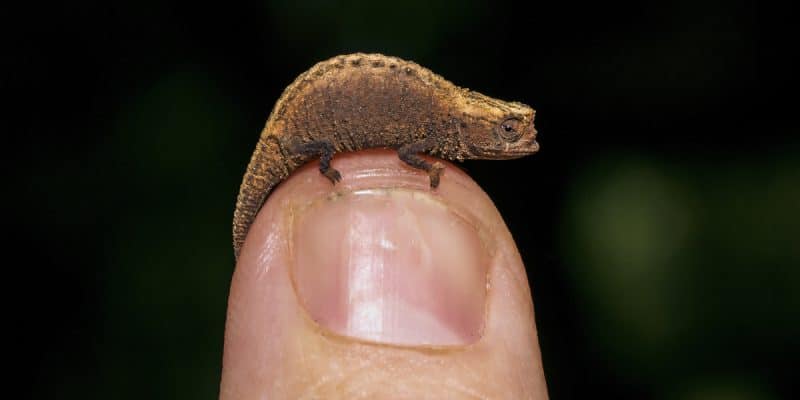South African researchers are calling on the Malawian government to stop deforestation in Mikundi, in the south of the country. According to researchers from the South African National Biodiversity Institute, the loss of vegetation cover in the Mikundi area could lead to the extermination of the Chapman's pygmy chameleon. One of the world's rarest animals, it reappeared in 2016 after 30 years of deforestation.
Continued deforestation in Mikundi, southern Malawi, would be fatal to the survival of one of the world’s rarest animals, the Chapman’s pygmy chameleon or Rhampholeon chapmanorum. In a study published on August 3rd, 2021, a team of researchers from the South African National Biodiversity Institute announced the reappearance of the pygmy chameleon in Malawi, while pointing out the cause of its non-observance for 30 years.
Since 2014, Krystal Tolley and her colleagues at the South African National Biodiversity Institute have been trying in vain to find traces of the pygmy chameleon in Malawi, leading to fears of the worst for this species, which was first observed by scientists in 1992 in this east African country by the herpetologist Colin Tilbury. At the time, the future of the brown chameleon, which measures barely 5 centimetres, was already a cause for concern. But thanks to satellite images, scientists have revealed that the area where the chameleon was originally described has been completely cleared and that the Malawi Hills region has lost 80% of its forests since the 1980s.
A critically endangered species
In another expedition, this time conducted in 2016 in the remaining forest patches of the Malawi Hills, the researchers’ efforts were successful. In the end, 38 adults and 11 juveniles were found in these forest patches, especially in the area near Mikundi.
However, samples taken from the chameleons showed that the genetic sequences of each population differed significantly. So much so that they were unable to reproduce with their fellow chameleons in neighbouring areas. This development could affect the genetic diversity of the species and increase the threats it faces. Based on these observations, the International Union for Conservation of Nature (IUCN) has classified the species as critically endangered.
To strengthen the animal’s protection status, scientists are calling on the Malawian authorities to stop deforestation in the areas where the species is observed. “The loss of forest requires immediate attention before this species reaches the point of no return. Urgent conservation action is needed, including a halt to forest destruction and habitat restoration to promote connectivity and stop population fragmentation,” warns Krystal Trolley.
Read also-AFRICA: when CSR comes to the rescue of biodiversity
Malawi is experiencing accelerated deforestation, with an estimated annual rate of 2.4%, triple the African average. In 20 years (1972 to 1992), Malawi’s vegetation cover was reduced by 57%. This drastic reduction in forest cover is particularly evident in the ‘customary’ forest lands (47% of Malawi’s forest area) in central and southern Malawi, which are owned by traditional leaders who allocate them according to customary use. Unlike forest reserves, national parks and wildlife sanctuaries, which are relatively protected, customary forests, are being encroached upon by the expansion of subsistence agriculture and the search for fuel wood. According to official figures, almost 97% of households in Malawi rely on wood or charcoal for cooking and heating. Even in urban areas, 54% of households use charcoal for cooking.
Boris Ngounou







